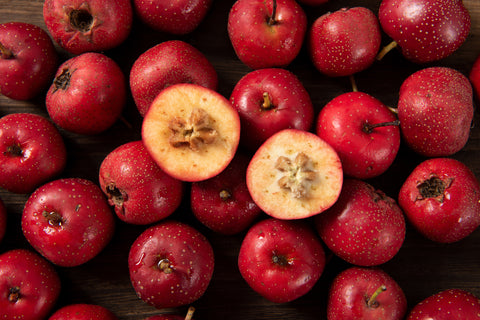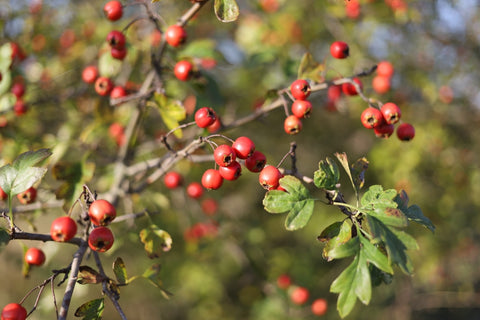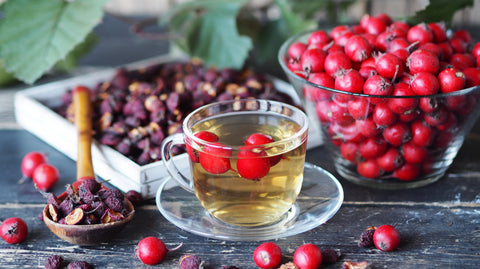Hawthorn Berry Health Benefits
April 04, 2024
The hawthorn berry, a small fruit that blooms from the Crataegus species, is well known as a natural remedy for various cardiovascular issues and for naturally promoting heart health. However, it also has many more health benefits beyond just supporting heart health. Revered in traditional medicines across the globe, this potent plant has been utilized for centuries, offering a natural approach to addressing a wide array of health concerns. In this article, we will discuss hawthorn berry and its many health benefits.
What Is Hawthorn Berry?

Hawthorn berry comes from the hawthorn plant, a genus of several hundred species known as Crataegus, which is part of the rose family. (1) These plants are deciduous and native to temperate regions of Europe, North America, and Asia. The hawthorn tree or shrub is characterized by its thorny branches, small, round fruits (the berries), and flowers that bloom in the spring. The berries typically turn a bright red when ripe and are both edible and nutritious.
Historically, hawthorn has been used for medicinal purposes for thousands of years. The berries, leaves, and flowers of the hawthorn plant are rich in a variety of bioactive compounds, including flavonoids, antioxidants, and oligomeric proanthocyanidins (OPCs). These compounds are thought to be responsible for the plant's health benefits, particularly its cardiovascular benefits.
What Are The Health Benefits of Hawthorn Berry?

Hawthorn berry is known to have numerous potential health benefits. Some of the top benefits of Hawthorn berry include:
Hawthorn Berry Supports Heart & Cardiovascular Health
Hawthorn berry is undoubtedly most well-known for its ability to support cardiovascular health. The berry, alongside the plant's leaves and flowers, is packed with bioactive compounds such as flavonoids, antioxidants, and oligomeric proanthocyanidins (OPCs). (2) These substances are celebrated for their vasodilating effects, improving blood flow and heart function while protecting against vascular damage.
Hawthorn Berry Supports Healthy Blood Pressure
Many people use hawthorn berry for blood pressure, a prevalent condition that often goes unnoticed due to its asymptomatic nature. The vasodilating properties of hawthorn berries facilitate smoother blood circulation, thereby easing the workload on the heart and contributing to lower blood pressure levels. Although individual results may vary, consistent supplementation with hawthorn extract has been shown to significantly reduce systolic and diastolic blood pressure, offering a complementary solution alongside lifestyle modifications. (3)
So, how much does hawthorn berry lower blood pressure? Well, the exact amount by which hawthorn berry can lower blood pressure can vary widely among individuals and is dependent on numerous factors, including the specific hawthorn product used, the dosage, and the individual's unique health status and response to the supplement. Studies suggest that hawthorn may be more effective when taken consistently over a period of weeks or months, and the reductions in blood pressure observed in studies are often in the range of a few points systolic and diastolic. Those interested in using hawthorn berry to help manage their blood pressure should consult with a healthcare provider to ensure safety and proper use.
Hawthorn Berry Supports Digestive Health
Hawthorn berry's benefits for the digestive system are also noteworthy. The fiber content in the berry aids in promoting regular bowel movements, while its enzymatic stimulation enhances nutrient breakdown and absorption. These properties collectively support digestive health, alleviating common issues like bloating and indigestion. (4)
Hawthorn Berry Has Calming Effects on Mental Well-Being
Hawthorn berry also possesses anti-anxiety properties and acts as a natural sedative, offering relief for stress, anxiety, and insomnia. Its interaction with mood-regulating brain receptors can help foster a sense of calm and improve sleep quality, contributing to overall mental well-being. (5)
Hawthorn Berry Has Antioxidant Properties
Hawthorn berry has a rich content of antioxidants—substances that play an essential role in safeguarding the body against oxidative stress and the cellular damage it can cause. (6) These antioxidants, including flavonoids and oligomeric proanthocyanidins, are powerful scavengers of free radicals, unstable molecules that can lead to cell damage and contribute to chronic diseases and aging. The antioxidant properties of hawthorn berry can help maintain healthy blood vessels, improve skin health, and support overall cardiovascular function by mitigating inflammation and enhancing blood flow. (7)
Hawthorn Berry Supports The Immune System
Hawthorn berry also supports the immune system by bolstering the body's defense mechanisms against infections. Its anti-inflammatory effects are crucial in reducing chronic inflammation, a root cause of numerous diseases, including arthritis and diabetes. (8)
Hawthorn Berry Supports Liver Function
The liver, a vital organ for detoxification and nutrient processing, can also benefit from hawthorn berries' protective properties. Hawthorn aids in liver tissue regeneration and improves liver enzyme levels, ensuring optimal liver function. (9)
What Are The Active Compounds in Hawthorn Berry?

The medicinal properties of plants are largely attributed to the bioactive compounds found within them. Hawthorn berries are abundant in beneficial bioactive compounds. The primary groups of bioactive substances in hawthorn include:
- Flavonoids: These are a diverse group of phytonutrients found in many fruits and vegetables. In hawthorn, flavonoids like quercetin and vitexin are thought to contribute to the berry's cardiovascular benefits. (8)
- Oligomeric Proanthocyanidins (OPCs): These are a type of polyphenol that is known for their antioxidant properties. OPCs in hawthorn are believed to strengthen blood vessel walls, reduce inflammation, and improve overall vascular health. (8)
- Phenolic Acids: Hawthorn contains phenolic acids such as chlorogenic acid, which is also an antioxidant and may have a variety of beneficial effects on health, including supporting heart health and modulating blood sugar. (8)
- Triterpenic Acids: Including ursolic acid and oleanolic acid, these compounds are noted for their anti-inflammatory and antioxidant properties. (8)
Incorporating Hawthorn Berry into Your Lifestyle
Incorporating hawthorn berry into your health regimen can be achieved through various forms, including hawthorn berry tea, hawthorn berry extract, and hawthorn berry capsules. Hawthorn berry tea, for instance, provides a soothing and medicinal beverage option, while extracts offer a more concentrated dose of the berry's active compounds for those seeking potent health benefits.
At Zuma Nutrition, we use hawthorn berry extract as a primary ingredient in our Heart Support tonic. This formula was carefully crafted to support heart health, healthy circulation, and healthy blood pressure levels.
Summary
The hawthorn berry is a powerful food with many potential health benefits, offering a natural solution to a wide range of health concerns. From its heart-healthy benefits to its supportive role in digestive health, mental well-being, skin care, immune support, and liver function, hawthorn berry is a potent natural remedy that has been utilized for centuries. As we continue to uncover and appreciate its diverse benefits, the hawthorn berry remains a valuable component of a comprehensive approach to wellness.
References
1 https://www.mountsinai.org/health-library/herb/hawthorn
2 https://www.ncbi.nlm.nih.gov/pmc/articles/PMC9498108/
3 https://www.ncbi.nlm.nih.gov/pmc/articles/PMC3350435/
4 https://www.ncbi.nlm.nih.gov/pmc/articles/PMC6556496/
5 https://pubmed.ncbi.nlm.nih.gov/20673180/
6 https://www.hsph.harvard.edu/nutritionsource/antioxidants
7 https://pubmed.ncbi.nlm.nih.gov/26795272/
True Health Starts with Feeding the Body

